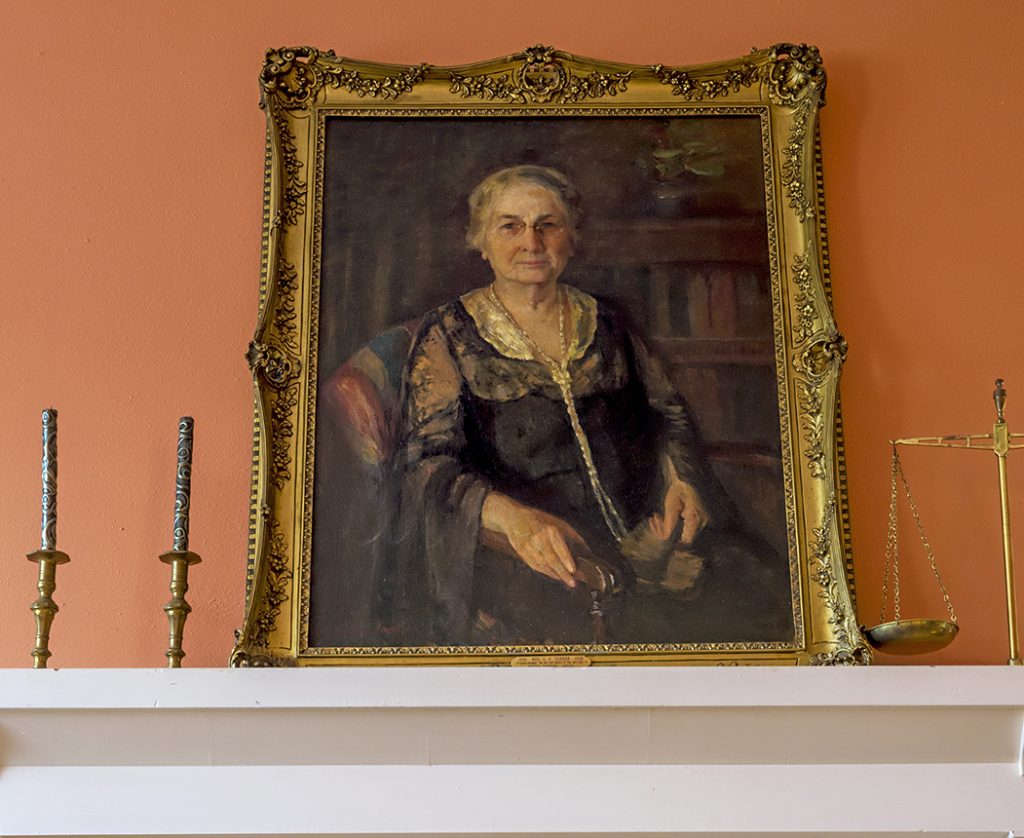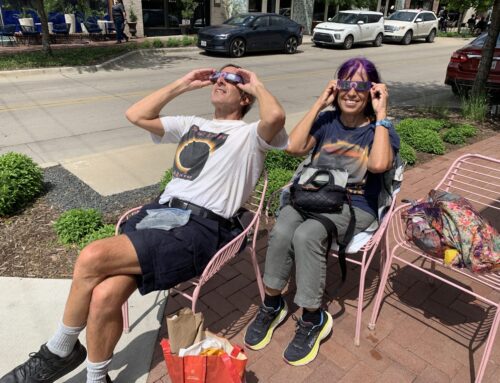
Mrs E.P. Turner above a mantle in The Turner House. Photo by Danny Fulgencio
Oak Cliffers have a way of making change in the City of Dallas.
Mrs. E.P. Turner, born Adella Kelsey in 1856, originated that sentiment.
She worked more than 50 years serving Dallas, advocating for the rights of juvenile delinquents, for better schools and improved city parks and services. She was a suffragist, a preservationist and a supporter of the arts who willed her home to the Oak Cliff Society of Fine Arts, which celebrates its 90th anniversary this year.
She and her husband, a railroad ticket office manager, lived in Dallas for several years before moving to the new township across the river. Mr. Turner was one of the first aldermen for the City of Oak Cliff before it was incorporated into Dallas. They lived on Ewing Avenue at Ninth Street, an intersection that no longer exists, near the original Oak Cliff downtown.
“At that time, there was no plan of garbage removal, and tin cans were an eyesore, while alleys were most unattractive,” she said in a 1927 interview. She organized the Ladies Improvement League of Oak Cliff in 1899 with the goal of beautifying the neighborhood, bettering sanitation and creating a kindergarten.
When Andrew Carnegie donated $25,000 to construct the original North Oak Cliff Library building in 1911, Mrs. Turner and her league quickly raised $5,000 for books, furniture and equipment.
But her civic involvement exceeded the boundaries of Oak Cliff.
She joined the Dallas Federation of Women’s Clubs, becoming president in 1902. Under her leadership, the club began “agitating for a juvenile court,” and they worked three sessions of the Texas Legislature to pass bills requiring cities to move children out of adult jails and into “detention homes.”
She also co-founded the Dallas Woman’s Forum and was its first president.
In 1908, she and Mrs. P.P. Tucker became the first women to serve on the Dallas County school board. Their work included improving school lunches and advocating for cleaner infrastructure.
She formed the Woman’s Good Citizen Association, which became the League of Women Voters of Dallas.
There was hardly a piece of civic life she didn’t touch, serving on boards and committees locally and statewide, too numerous to list.
Oak Cliff Society of Fine Arts
The great Texas impressionist Frank Reaugh and 19 others founded the Oak Cliff Society of Fine Arts in 1926.
One of the 19, of course, was Mrs. E.P. Turner. And, of course, she was its first president.
The club, which had about 600 members by 1930, held exhibitions for local artists, often purchasing artists’ work as a top prize. Because of that practice, the club now owns several paintings by members of the famed Dallas Nine and students of Reaugh.
But it wasn’t just about art in the early days. The club also planted the rose gardens at Lake Cliff Park — almost 2,000 bushes — and gave away another 2,000 rose bushes to Oak Cliff neighbors for planting in their own gardens.
It hosted literature and history discussions, flower shows and music recitals.
The club originally met at El Sibil, Reaugh’s home and studio near Lake Cliff Park.
Later it would meet in members’ homes, including the Turners’ house at 324 S. Marsalis. It was described as a two-story white colonial with “an endless list of flowers and shrubs” on its park-like grounds.
When Mrs. Turner died in 1938, her sons donated that house to the Oak Cliff Society of Fine Arts. Club members then raised $4,000 in one year for renovations.
They turned the second floor of the house into two revenue-generating apartments. On the ground floor, they built an auditorium that could seat 400 for plays and concerts.
The State of Texas bought the old Turner house and demolished it for the construction of Interstate 35 in 1957. With the proceeds from that sale, the Oak Cliff Society of Fine Arts bought a new clubhouse in Winnetka Heights.
Turner House
J.P. Blake, one of the original developers of Winnetka Heights, built the mansion on Rosemont Avenue at Eighth Street in 1912 at a cost of $55,000.
The Blakes held lavish lawn parties and musical events there but sold the house in 1918, according to the club’s extensive research of the property.
A judge owned it for a while and then a lawyer bought it in 1923. The lawyer turned it into a boarding house sometime during the Great Depression.
The Oak Cliff Lutheran Church occupied it in the late 1940s and made a number of changes. They removed the original porch floor tile and the living room fireplace and installed parquet over the original hardwood floors, to name a few.
When the club acquired the house in 1957, they named it the E.P. Turner Clubhouse.
The name honored Mrs. Turner’s husband, who had worked 26 years for the railroad and done his civic duty as well.
But Mrs. Turner was at the heart of the club, and in 2002, the members renamed it Turner House in her honor.
By the 1930s, Turner was the “dean of Dallas clubwomen,” a beloved character in Dallas life.
She was named honorary lifetime president of the Oak Cliff Society of Fine Arts. In 1932, a coalition of Oak Cliff clubs passed a resolution that honored her as “an outstanding civic leader who is loved, honored and respected by every man, woman and child in our community, who has shown her ability and willingness to take the leadership in every worthwhile project.”
Current Oak Cliff Society of Fine Arts members continue raising funds to keep up the 104-year-old house; it’s also an event venue that can be rented for weddings and parties. The club begins celebrating its 90th anniversary this month with its fourth-annual Rising Star exhibit and fundraiser, read more here. —Rachel Stone





